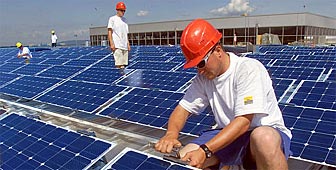Solar energy left in the shadows

Energy experts say Switzerland has lost its position as a global leader in solar energy because of a lack of political backing for alternative sources of power.
Supporters of solar power aim to highlight this “wasted opportunity” during a series of demonstrations across the country over the weekend to mark “Solar Day”.
“For many years we were out in front,” admitted Urs Wolfer, responsible for solar power at the Federal Energy Office.
“Now we are being caught up and overtaken by various other European countries, and even the United States and Japan.”
Switzerland was one of the first countries to take advantage of the potential of converting the sun’s rays into electricity. The first solar-powered house in Europe was set up at Canobbio in canton Ticino in 1982.
And as recently as ten years ago, the country was considered one of the most important producers of solar energy.
Harsh blow
But four years ago the solar energy sector suffered a major blow when voters rejected a proposal to levy a tax on non-renewable energy sources such as gas and petrol.
The revenue raised would have been used to promote better energy consumption and alternative energy sources.
Then last year parliament decided to slash a fifth of the budget of SwissEnergy, a government programme to ensure that Switzerland achieves its energy and climate policy targets.
These include reducing greenhouse gas emissions and promoting renewable energy sources, such as solar power.
“For Switzerland, hopes that it would assume the role of a pioneer in the domain of solar power and renewable energy seem to have disappeared,” Wolfer told swissinfo.
Last month the environment agency told the government that it would not meet its targets on cutting greenhouse gases by 2010 unless radical action was taken.
Wasted opportunity
“It’s a wasted opportunity,” said David Stickelberger, secretary of Swisssolar, a solar power lobby group. “The government is reducing its support, just when solar energy is coming out of its experimental phase.”
“If solar energy is developing much faster in Germany or in Japan, it’s because these countries have introduced notable financial incentives,” he added.
It is estimated that in order to be competitive, the solar energy market needs at least ten years of state assistance. Solar power costs three to four times more than nuclear or hydroelectric power.
Yet the sector is expanding, with large international companies such as BP, Shell, Siemens and Mitsubishi starting to invest in solar power.
Left behind
It is this fear of being left behind – as well as the lack of political will – which has prompted Swisssolar and other lobby groups to organise around 80 demonstrations across Switzerland at the weekend.
The aim is to help raise public awareness and show that solar power is a viable alternative.
It is estimated that only 0.02 per cent of energy consumed worldwide – and 0.11 per cent of Swiss energy – is generated by the sun’s rays.
Currently, 130 electricity companies sell solar power on their networks and 40,000 buildings use solar panels.
But it is estimated that in order to cover 70 per cent of the hot water needs of a family of five, it would require solar panels worth SFr10,000-SFr15,000 ($7,800-$11,800). The investment would only pay itself off over 20 to 30 years.
Stickelberger admits that there is still a long way to go before people are persuaded of the merits of using solar power.
“We’ll still need a bit of idealism over the next few years,” he said.
swissinfo, Armando Mombelli (translation: Isobel Leybold)
Only 0.11% of power comes from solar energy in Switzerland.
80% of Swiss energy comes from abroad.
The most important sources of energy in Switzerland are petrol (61%), electricity (21%) and gas (11%.)

In compliance with the JTI standards
More: SWI swissinfo.ch certified by the Journalism Trust Initiative














You can find an overview of ongoing debates with our journalists here . Please join us!
If you want to start a conversation about a topic raised in this article or want to report factual errors, email us at english@swissinfo.ch.